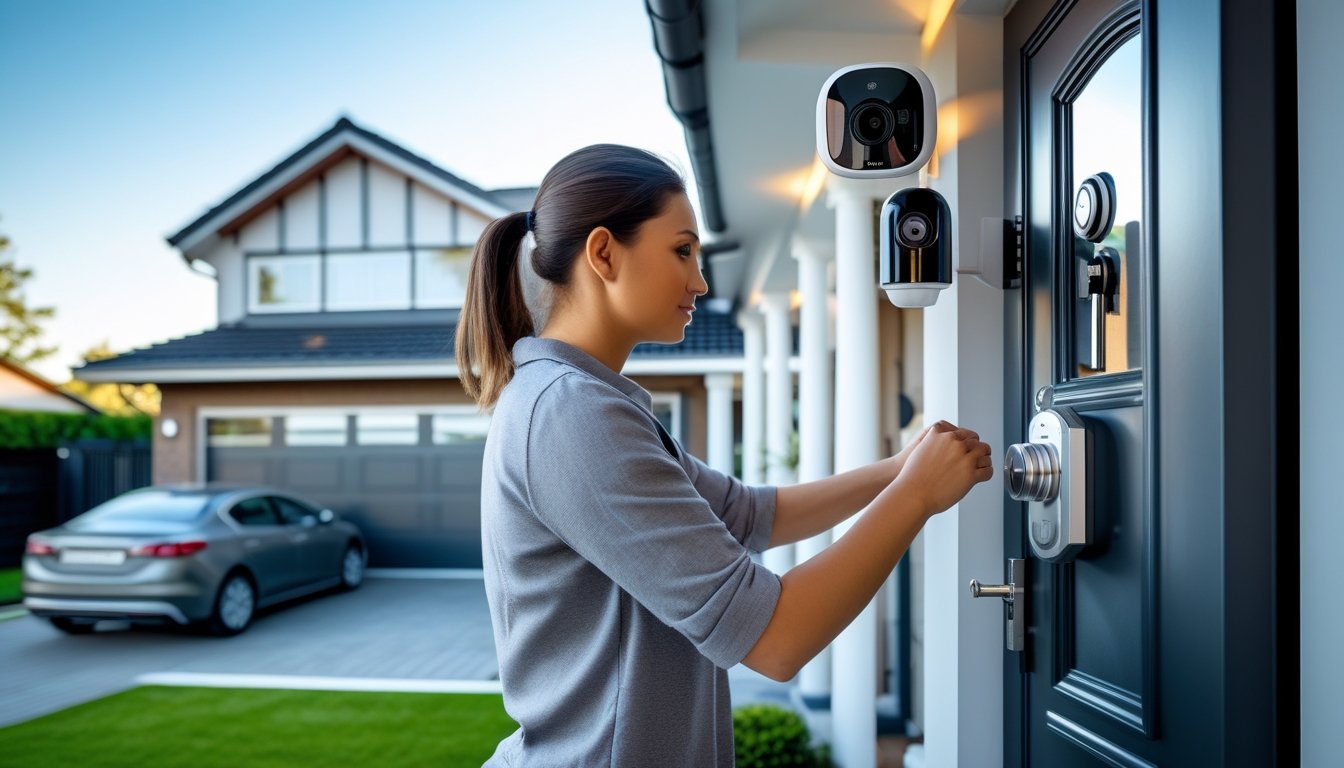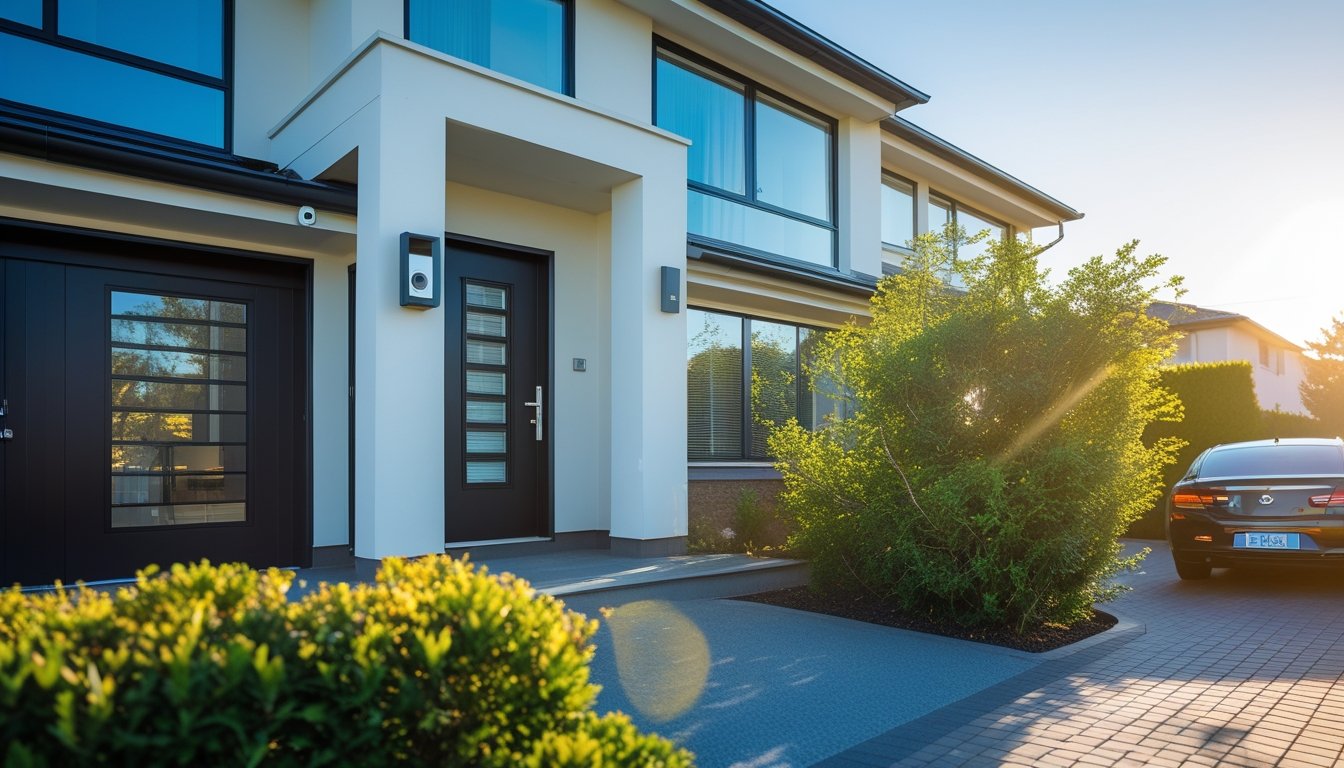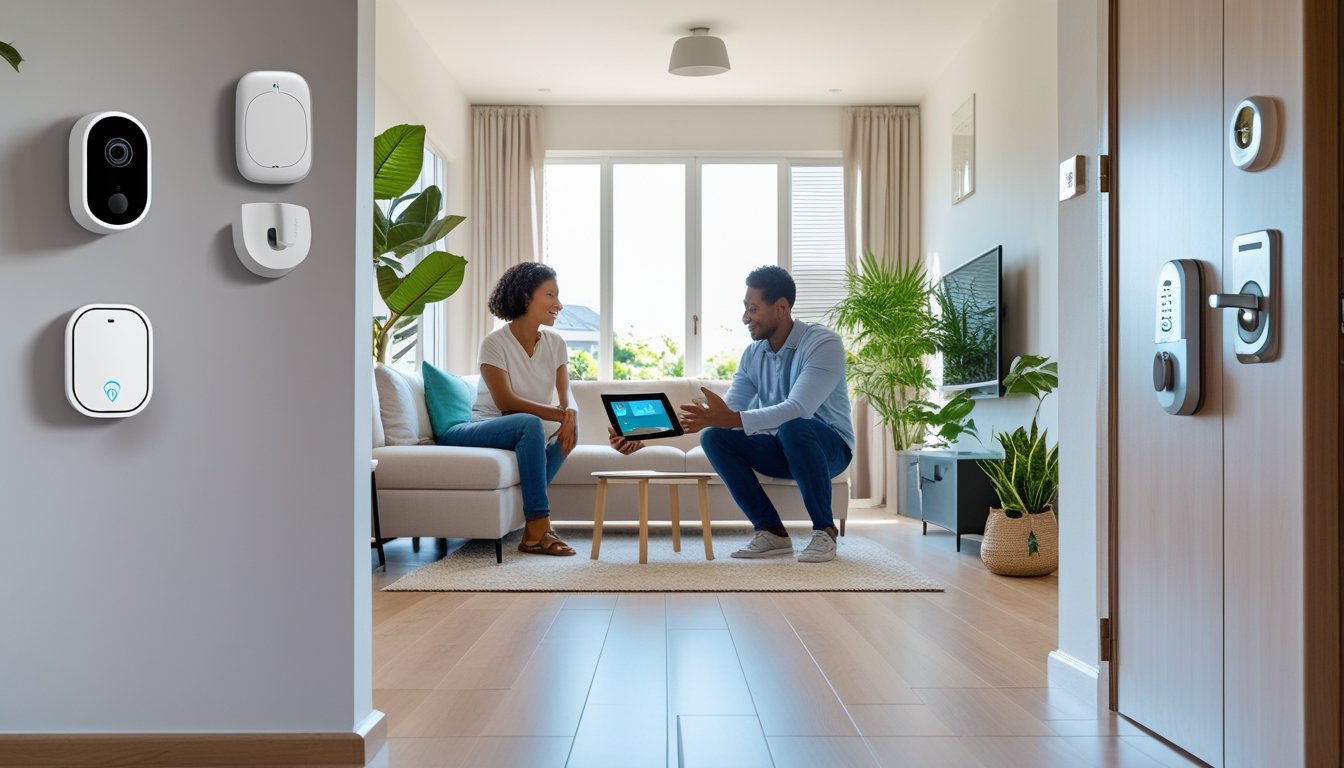Late updated: 01 Sep 2025 09:09
Written by: Elena Prescott
Guide To Basic Home Security Mistakes To Avoid: Essential Tips For Safety
Home security is more than just having a lock on your front door; it's about creating a safe haven for your loved ones. Many homeowners believe they are doing enough, yet simple oversights can leave a home vulnerable. Recognising and addressing basic home security mistakes can significantly decrease the chances of a burglary.

In our communities, safety begins with knowledge and preparation. By understanding the most common lapses in home security, we can proactively protect our homes. We'll delve into errors that are often overlooked, from inadequate lighting to insecure windows, revealing how these can make our homes targets for crime.
As we guide you through avoiding these pitfalls, remember that even minor changes can have a major impact. A well-protected home not only ensures physical safety but also provides peace of mind.
Key Takeaways
- Addressing security oversights reduces burglary risk.
- Small changes bolster the home's physical defences.
- Knowledge and preparation enhance safety and peace.
Common Home Security Mistakes And How To Avoid Them
Addressing mistakes in home security can significantly reduce the risk of intrusion. By focusing on details like locking mechanisms, secure storage of spare keys, efficient use of security systems, and minimising visibility of valuables, we can enhance our home's protection.
Forgetting To Lock Doors And Windows
It's surprisingly common to neglect locking doors and windows, leaving homes vulnerable. This simple oversight can provide easy access for burglars. Utilising high-quality locks, such as deadbolts and secure window latches, significantly boosts security.
Routine checks before leaving home can ensure all entry points are secured. Installing smart locks or window locks that provide remote access can add an extra layer of convenience and safety. Regular maintenance and inspections of these locks keep them functioning correctly, reducing the chances of failures.
Improper Use Of Spare Keys
Leaving spare keys under the doormat or a flowerpot seems convenient, yet these are the first places burglars check. Consider investing in a lockbox to securely store spare keys.
Alternatively, sharing a spare key with a trusted neighbour can be more secure. Leveraging technological advancements, we can adopt smart locks that allow keyless entry, eliminating the need for spare keys altogether. Remember, hiding keys effectively can make a difference between safety and vulnerability.
Neglecting Security Systems
Having a security system is only beneficial if it is armed when needed. Many of us forget to activate our systems, leaving our homes unprotected. Regularly testing alarms ensures their reliability.
Incorporating security cameras can add an extra layer of security by providing surveillance and acting as a deterrent. Keeping the system up-to-date with the latest software and making use of mobile alerts helps in timely detection of any suspicious activity. Awareness and regular usage are key to making security systems effective tools in home protection.
Leaving Valuables In Sight
Leaving valuables in plain sight acts as an invitation for potential intruders. Items such as jewellery, electronics, and cash should be stored in a home safe.
Drawing curtains or closing blinds effectively blocks views from outside, keeping personal belongings hidden. Utilising rooms strategically by placing valuables away from windows also helps in minimising risk. Creating habits around securing our possessions keeps prying eyes at bay and enhances the overall security of our living spaces.
Physical Vulnerabilities In And Around The Home

To fortify our homes, we must address key areas of weakness that can be exploited by intruders. Focusing on outdoor lighting, landscaping, monitoring, and travel disclosures can significantly enhance security measures and minimise risks.
Inadequate Outdoor Lighting
Effective outdoor lighting is crucial to deter potential intruders. Motion-activated lights can play a vital role by surprising and alerting us to unexpected movement around our property. Dark or dimly lit areas provide cover for trespassers, making them a risk we need to address.
In strategic locations such as pathways, doorways, and driveways, installing a combination of bright bulbs and motion sensors can dramatically reduce this vulnerability. We recommend employing energy-efficient lighting solutions to ensure effectiveness without significantly increasing utility costs.
Overgrown Bushes And Landscaping
Our garden may seem simply decorative, but unmanaged greenery can pose significant security threats. Overgrown bushes and dense landscaping offer perfect hiding spots for criminals. By maintaining trimmed hedges and branches, we can eliminate the cover these plants provide and improve overall visibility.
Incorporating thorny plants near windows may serve as a natural deterrent. Furthermore, we can utilise low fencing and strategically placed plants to guide movement and keep potential threats at bay. It’s crucial to maintain a balance between aesthetics and security.
Lack Of Professional Monitoring
Relying solely on manual security measures can leave gaps in our defence strategy. Engaging a professional monitoring service enhances the overall security system, providing 24/7 oversight and immediate response to any alerts. These services can notify authorities quickly, ensuring potential threats are addressed efficiently.
Smart home security systems offer automation that enables real-time alerts sent directly to our devices. This includes both security breaches and environmental concerns. Consider integrated systems that allow for both video monitoring and emergency response coordination.
Publicly Sharing Travel Plans
In the age of social media, sharing our travel itineraries publicly can inadvertently compromise home security. Announcing departures gives potential burglars a timeline of when the house will be unoccupied. It’s essential that we avoid broadcasting trips or absences online until after the fact.
Instead, let’s inform a trusted neighbour or friend to keep an eye on the property and collect any mail. Utilising smart home automation, such as lights and blinds, can create the illusion of occupancy, further deterring opportunistic intruders during our absence.
Frequently Asked Questions

In addressing basic home security, some common mistakes arise. Weaknesses in door and window security often present opportunities for intruders. Poor lighting around the home can create unchecked vulnerabilities. Oversharing on social media unknowingly reveals too much information.
What are the most common oversights homeowners make regarding door and window security?
Many of us forget to regularly check the integrity of locks or rely on standard locks instead of deadbolts. Additionally, windows are often left unsecured or fitted with inadequate locks, making them easy targets.
How can inadequate exterior lighting lead to home security vulnerabilities?
Dark areas around the home provide excellent cover for unwanted visitors. Adequate lighting, including motion sensor lights, reduces these hiding spots, deterring potential intruders.
In what ways do social media users inadvertently compromise their home security?
We frequently post about holidays or daily routines on social media. This information signals when properties are unoccupied, making them vulnerable to break-ins.
What role does the lack of a security system play in residential burglaries?
Homes without alarm systems or surveillance cameras are often targeted. These systems act as deterrents, alerting us and authorities to any unauthorised entries.
How might misplaced trust in 'safe' neighbourhoods contribute to security lapses?
Assuming our neighbourhood is immune to crime can lead to complacency. We may neglect basic security measures, leaving our homes exposed to opportunistic crimes.
What are the risks of failing to secure garages and sheds?
Garages and sheds often contain valuable items like bicycles or tools. Leaving them unlocked provides easy access to these assets and occasionally offers alternative entry points to our homes.
